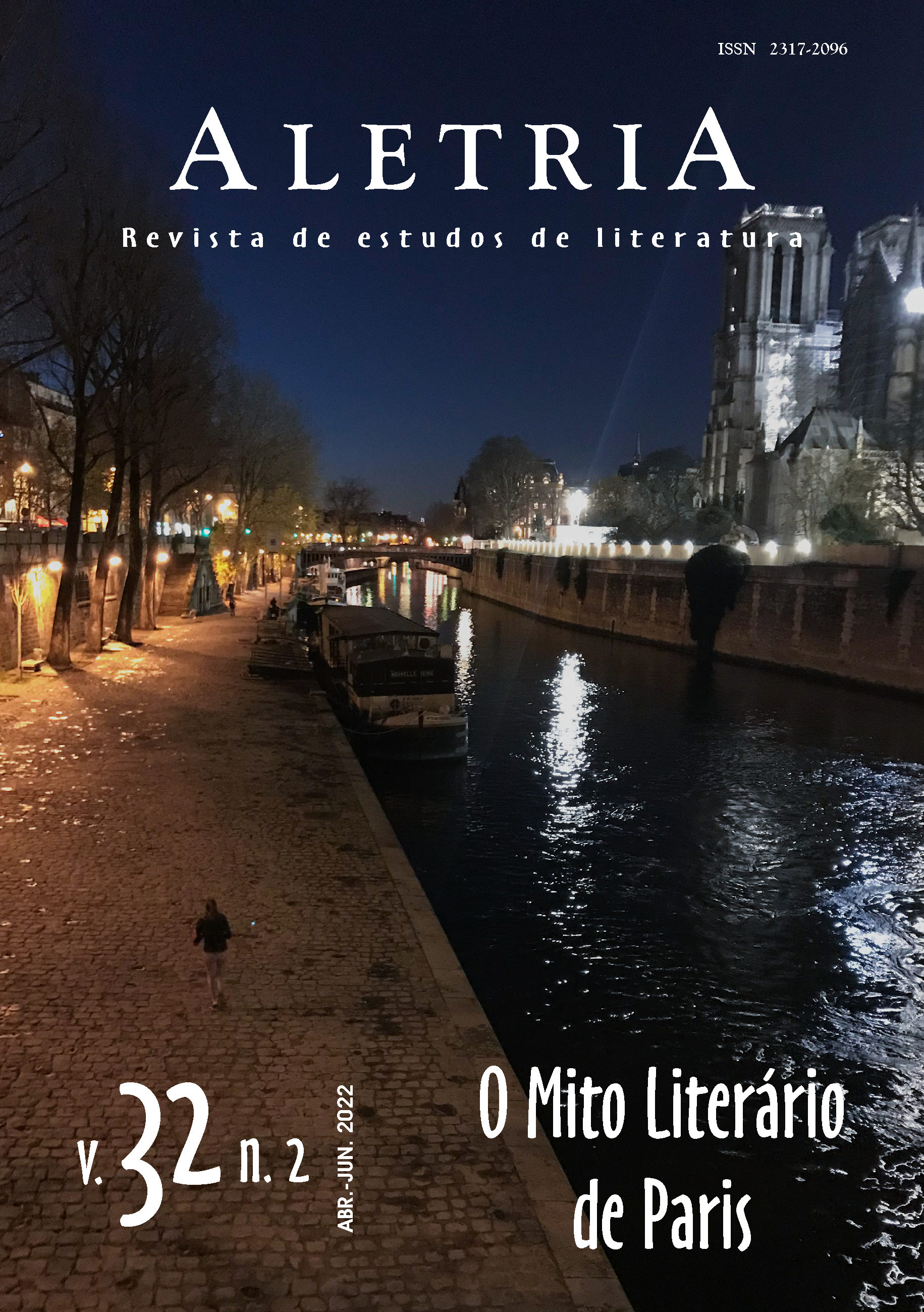Os Kafkas de Coetzee
a última lição de Elizabeth Costello
DOI:
https://doi.org/10.35699/2317-2096.2022.36969Palavras-chave:
Kafka, Coetzee, Elizabeth Costello, parábolas, romance contemporâneoResumo
O propósito deste artigo é sugerir que “No portão”, o capítulo final de Elizabeth Costello, de J. M. Coetzee, não apenas se apropria de “Diante da lei”, de Kafka, mas também reconfigura, de modo bem menos evidente, um outro texto do escritor, “Das parábolas”. Para tanto, depois de examinar a enigmática parábola e algumas de suas leituras críticas, busca-se mostrar como a “lição” de Coetzee também traça, em chave ficcional, um amplo comentário sobre as distinções entre “este lado” e “do outro lado” e sobre a afirmação de que toda a parábola, no fundo, quer apenas dizer que o “inexplicável é inexplicável” e que, ao fazer isso, também discute as relações entre literatura e conhecimento.
Downloads
Referências
AGAMBEN, Giorgio. Defesa de Kafka contra os seus intérpretes. In: AGAMBEN, G. Ideia da prosa. Tradução de João Barrento. Lisboa: Cotovia, 1999. p. 135-136.
AGAMBEN, Giorgio. Il fuoco e il racconto. Milão: Nottetempo, 2014a.
AGAMBEN, Giorgio. Nudez. Tradução de Davi Pessoa. Belo Horizonte: Autêntica, 2014b.
AGAMBEN, Giorgio. O fogo e o relato. Tradução de Andrea Santurbano e Patricia Peterle. São Paulo: Boitempo, 2018.
ATTRIDGE, Derek. J. M. Coetzee and the Ethics of Reading. Chicago: The University of Chicago Press, 2004a.
ATTRIDGE, Derek. The Singularity of Literature. New York: Routledge, 2004b.
BETHLEHEM, Louise. Elizabeth Costello as post-apartheid text. In: BOEHMER, E.; EAGLESTONE, R.; IDDIOLS, K. (Org.). J.M. Coetzee in Context and Theory. Londres: Continuum, 2009. p. 20-35.
COETZEE, John Maxwell. Elizabeth Costello. São Paulo: Companhia das Letras, 2003.
CROSSAN, John Dominic. Raid the Articulate. Oregon: Wipf and Stock, 2008.
GRAY, Richard T. (Ed.). Franz Kafka Encyclopedia. Connecticut: Greenwood, 2005.
GRAY, Richard T. Constructive Destruction: Kafka’s Aphorisms: Literary Tradition and Literary Transformation. Tübingen: Max Niemeyer Verlag, 1987.
HANSEN, João Adolfo. Alegoria, construção e interpretação da metáfora. Campinas: Hedra: Editora da Unicamp, 2006.
HOMERO. Odisseia. Tradução de Carlos Alberto Nunes. Rio de Janeiro: Ediouro, 2001.
JOHNSON, Gary. The Vitality of Allegory: Figural Narrative in Modern and Contemporary Fiction. Ohio: University of Ohio Press, 2012.
KAFKA, Franz. Parábolas e fragmentos. Tradução de João Barrento. Lisboa: Assírio e Alvim, 2012.
KAFKA, Franz. Um médico rural – pequenas narrativas. São Paulo: Companhia das Letras, 1999.
KERMODE, Frank. The Genesis of Secrecy. Cambridge: Harvard University Press, 1979.
MEDIN, Daniel. Three Sons: Franz Kafka and the Fiction of J.M. Coetzee, Philip Roth, and W.G. Sebald. Illinois: Northwestern University Press, 2010.
MILLER, J. Hillis. Parábolas e performativos nos evangelhos e na literatura moderna. In: MILLER, J. H. A ética da leitura. Rio de Janeiro: Imago, 1995. p. 177-197.
MOSCA, Valéria. “A Purgatory of Clichés”: Elizabeth Costello and the Impossible Paradise for Writers. Altre modernitá, Milão, v. 7, p. 126-138, 2012.
NASCIMENTO, Evando. Literatura no século 21: expansões, heteronomias, desdobramentos. Revista Brasileira de Literatura Comparada, Rio de Janeiro, v. 18, n. 28, 2016.
NAVEH, Gila Safran. Biblical Parables and Their Modern re-Creations. New York: State University of New York Press, 2000.
PIPPIN, Robert Buford. Philosophical Fiction? On J.M. Coetzee’s Elizabeth Costello. In: MEHIGAN, T.; MOSER, C. (Org.). The intellectual landscape in the works of J.M. Coetzee. Rochester: Camden House, 2018. p. 294-310.
POLITZER, Heinz. Franz Kafka, Parable and Paradox. Ithaca: Cornell University Press, 1962.
SHARKEY, E. Joseph. “On Parables”: the Value of Already Knowing that the Incomprehensible is Incomprehensible. In: SHARKEY, E. J. Idling the Engine: Linguistic Skepticism in and Around Cortazar, Kafka, and Joyce. Washington, DC: Catholic University of America Press, 2006. p. 156-189.
THIHER, Allen. Franz Kafka: a Study of the Short Fiction. Woodbridge: Twayne, 1990.
WOOD, Michael. Kafka’s China and the Parable of Parables. Philosophy and Literature, Baltimore, v. 20, n. 2, p. 325-336, 1996.
WOOD, Michael. Literature and the Taste of Knowledge. Cambridge: Cambridge University Press, 2005.
Downloads
Publicado
Edição
Seção
Licença
Copyright (c) 2022 ADRIANO SCHWARTZ (Autor)

Este trabalho está licenciado sob uma licença Creative Commons Attribution 4.0 International License.
Autores que publicam nesta revista concordam com os seguintes termos:Autores mantém os direitos autorais e concedem à revista o direito de primeira publicação, com o trabalho simultaneamente licenciado sob a Licença Creative Commons Attribution que permite o compartilhamento do trabalho com reconhecimento da autoria e publicação inicial nesta revista.Autores têm autorização para assumir contratos adicionais separadamente, para distribuição não-exclusiva da versão do trabalho publicada nesta revista (ex.: publicar em repositório institucional ou como capítulo de livro), com reconhecimento de autoria e publicação inicial nesta revista.Autores têm permissão e são estimulados a publicar e distribuir seu trabalho online (ex.: em repositórios institucionais ou na sua página pessoal) a qualquer ponto antes ou durante o processo editorial, já que isso pode gerar alterações produtivas, bem como aumentar o impacto e a citação do trabalho publicado (Veja The Effect of Open Access).














